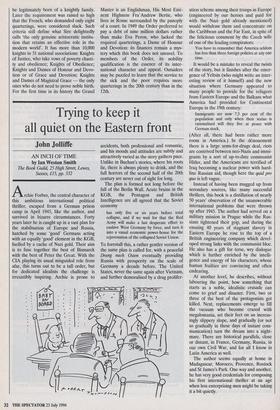Trying to keep it all quiet on the Eastern front
John Jolliffe
AN INCH OF TIME by Ian Weston Smith The Book Guild, 25 High Street, Lewes, Susses £15, pp. 332 Archie Forbes, the central character of this ambitious international political thriller, escaped from a German prison camp in April 1945, like the author, and survived in bizarre circumstances. Forty years later he is caught up in a vast plan for the stabilisation of Europe and Russia, hatched by some 'good' Germans acting with an equally 'good' element in the KGB, fuelled by a cache of Nazi gold. Their aim is to fuse together the best of Bismarck with the best of Peter the Great. With the CIA playing its usual misguided role from afar, this turns out to be a tall order, but for dedicated idealists the challenge is irresistibly inspiring. Archie is prone to accidents, both professional and romantic, and his moods and attitudes are subtly and attractively varied as the story gathers pace. Unlike in Buchan's stories, where his roots lie, there is always plenty to drink, and the full horrors of the second half of the 20th century are never out of sight for long.
The plan is formed not long before the fall of the Berlin Wall. Acute brains in the KGB, the Pentagon and British Intelligence are all agreed that the Soviet economy '
has only five or six years before total collapse, and if we wait for that the Red Army will make a last desperate effort to enslave West Germany by force, and turn it into a vakNal economic power-house for the rejuvenation of the collapsed Soviet Union.
To forestall this, a rather gentler version of the same plan is called for, with a peaceful Drang nach Osten eventually providing Russia with prosperity on the scale of Germany a decade before. The United States, never the same again after Vietnam, and further demoralised by a drug prolifer- ation scheme among their troops in Europe (engineered by our heroes and paid for with the Nazi gold already mentioned) would withdraw them and concentrate on the Caribbean and the Far East, in spite of the felicitous comment by the Czech wife of one of the leading conspirators:
You have to remember that America seldom has less than three foreign policies at any one time.
It would be a mistake to reveal the twists of the story, but it finishes after the emer- gence of Yeltsin (who might write an inter- esting review of it himself) and the new situation where Germany appeared to many people to provide for the refugees from Eastern Europe and the Balkans what America had provided for Continental Europe in the 19th century:
Immigrants are now 73 per cent of the population and only when their status is rationalised will they live at peace with German stock.
(After all, there had been rather more room in America.) In the denouement there is a large arms-for-drugs deal, riots are contrived between neo-Nazis and immi- grants by a sort of up-to-date communist Hitler, and the Americans are terrified of Iraq becoming a nuclear power with hard- line Russian aid, though here the quid pro quo is left vague.
Instead of having been mugged up from secondary sources, like many successful thrillers, this book is a distillation of nearly 50 years' observation of the unanswerable international problems that were thrown up after 1945. The author had served on a military mission in Prague while the Rus- sians tightened their grip, and during the ensuing 40 years of stagnant slavery in Eastern Europe he rose to the top of a British engineering company which devel- oped strong links with the communist bloc. He also has a gift for terse, wry dialogue which is further enriched by the intelli- gence and energy of his characters, whose human frailties are convincing and often endearing.
At another level, he describes, without labouring the point, how something that starts as a noble, idealistic crusade can come to grief and disaster_ First, two or three of the best of the protagonists get killed. Next, replacements emerge to fill the vacuum who become crazed with megalomania, set their feet on an increas- ingly slippery slope, and gradually (or not so gradually in these days of instant com- munication) turn the dream into a night- mare. There are historical parallels, close or distant, in France, Germany, Russia, in our own Civil War, and for all I know in Latin America as well.
The author seems equally at home in Madagascar, Morocco, Provence, Rostock and St James's Park. One way and another, he has very good credentials for composing his first international thriller at an age when less enterprising men might be taking it a bit quietly.


















































 Previous page
Previous page